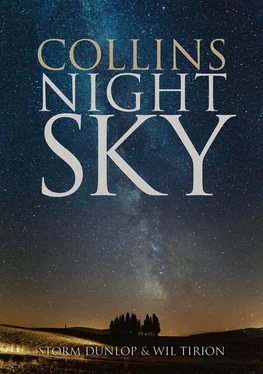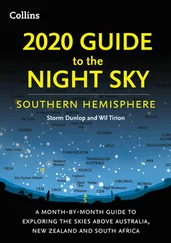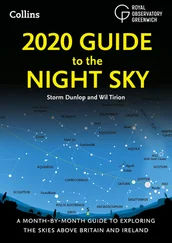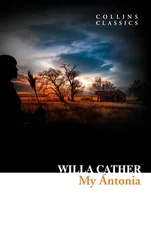COLLINS
NIGHT
SKY
STORM DUNLOP & WIL TIRION

CONTENTS
Cover
Title Page COLLINS NIGHT SKY STORM DUNLOP & WIL TIRION
HOW TO USE THIS BOOK
OBSERVING THE NIGHT SKY
What to use COLLINS NIGHT SKY STORM DUNLOP & WIL TIRION
Starting out COLLINS NIGHT SKY STORM DUNLOP & WIL TIRION
Exploring the night sky COLLINS NIGHT SKY STORM DUNLOP & WIL TIRION
The celestial sphere COLLINS NIGHT SKY STORM DUNLOP & WIL TIRION
Positions in the sky COLLINS NIGHT SKY STORM DUNLOP & WIL TIRION
Date and time COLLINS NIGHT SKY STORM DUNLOP & WIL TIRION
Constellations
The names of stars and other objects
Magnitudes
Photographing the night sky
THE CELESTIAL SPHERE
Winter constellations
Spring constellations
Summer constellations
Autumn constellations
MONTHLY CHARTS
THE MOON
Lunar eclipses
The surface of the moon
North-west quadrant
North-east quadrant
South-west quadrant
South-east quadrant
THE PLANETS
Planetary positions
Minor planets
OBJECTS IN THE SKY
Nacreous and noctilucent clouds
Aurorae
Rockets and satellites
Meteors and the zodiacal light
Comets
Stars
Clusters
Nebulae
Galaxies
CONSTELLATIONS
ADDITIONAL TABLES
FURTHER INFORMATION
GLOSSARY
INDEX
Copyright
About the Publisher
HOW TO USE THIS BOOK HOW TO USE THIS BOOK OBSERVING THE NIGHT SKY What to use COLLINS NIGHT SKY STORM DUNLOP & WIL TIRION Starting out COLLINS NIGHT SKY STORM DUNLOP & WIL TIRION Exploring the night sky COLLINS NIGHT SKY STORM DUNLOP & WIL TIRION The celestial sphere COLLINS NIGHT SKY STORM DUNLOP & WIL TIRION Positions in the sky COLLINS NIGHT SKY STORM DUNLOP & WIL TIRION Date and time COLLINS NIGHT SKY STORM DUNLOP & WIL TIRION Constellations The names of stars and other objects Magnitudes Photographing the night sky THE CELESTIAL SPHERE Winter constellations Spring constellations Summer constellations Autumn constellations MONTHLY CHARTS THE MOON Lunar eclipses The surface of the moon North-west quadrant North-east quadrant South-west quadrant South-east quadrant THE PLANETS Planetary positions Minor planets OBJECTS IN THE SKY Nacreous and noctilucent clouds Aurorae Rockets and satellites Meteors and the zodiacal light Comets Stars Clusters Nebulae Galaxies CONSTELLATIONS ADDITIONAL TABLES FURTHER INFORMATION GLOSSARY INDEX Copyright About the Publisher
This book is intended for those taking an interest in the sky, wanting to find their way around among the many constellations, and also carry out simple observing with the naked eye, binoculars or small telescopes.
The first section begins with some general advice on OBSERVING THE NIGHT SKY. This is followed EXPLORING THE SKY COLLINS NIGHT SKY STORM DUNLOP & WIL TIRION
by information that will help readers to locate objects in the sky, and also to understand the charts, diagrams, and tables of positions that are provided both in this book and elsewhere. This portion includes descriptions on the names of stars and other celestial objects, together with the reasons for their differences in brightness and colour. The section ends with some information about simple photography.
The next section will help beginners to find their way around the sky. This is not as complicated as it might at first appear. Everyone starts by learning to recognize the five main circumpolar constellations, which are visible whenever the sky is clear ( THE CELESTIAL SPHERE COLLINS NIGHT SKY STORM DUNLOP & WIL TIRION
). The next few pages describe the location and recognition of the constellations that are most clearly visible at different seasons, together with the most notable objects in that part of the sky. Although arranged to start with the winter, readers may choose any season to begin observing. The same applies to the following section (MONTHLY CHARTS), which shows the appearance of the night sky with two charts for each month of the year, looking north and looking south.
Specific information about individual objects follows, beginning with the Moon (THE MOON), and then the planets, including detailed charts showing planetary positions for a period of five years. These are followed by charts showing the periods when some of the brighter minor planets (asteroids) are visible in small instruments.
The next section (OBJECTS IN THE SKY) describes individual phenomena or objects in more detail, ranging from unusual high-altitude clouds that are visible in twilight or in the middle of the night, to distant galaxies.
The final section (CONSTELLATIONS) may be used at any time, but comes into its own when readers are moderately familiar with finding their way around the sky. There are charts and photographs of all the constellations visible to mid-latitude northern-hemisphere observers, together with a description of objects of interest. The positions of meteor radiants are shown, and charts and comparison stars are given for a number of interesting variable stars. Details of sources of further information, and a glossary.
Конец ознакомительного фрагмента.
Текст предоставлен ООО «ЛитРес».
Прочитайте эту книгу целиком, купив полную легальную версию на ЛитРес.
Безопасно оплатить книгу можно банковской картой Visa, MasterCard, Maestro, со счета мобильного телефона, с платежного терминала, в салоне МТС или Связной, через PayPal, WebMoney, Яндекс.Деньги, QIWI Кошелек, бонусными картами или другим удобным Вам способом.













